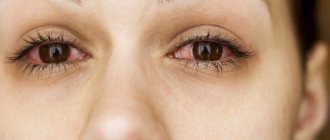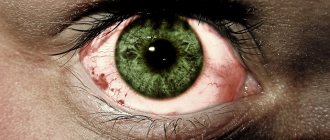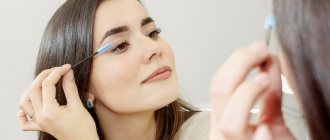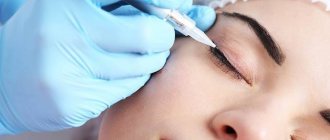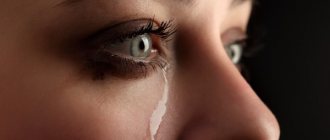The procedure for eyelash extensions has remained quite in demand for a long time. Thanks to her, the eyes become more expressive, bright, and attractive. However, a phenomenon such as redness of the eyelids or eyes is often observed.
In some cases, burns of the corneal surface may occur after extensions. Why does it occur and what to do if your eyes become inflamed, start to water, and turn red?
Eyelash extensions: features
The eyelash extension process involves fixing artificial hairs to the surface of the eyelids using a special adhesive. This ensures expressiveness of the look, eyelashes look longer, thicker, and more voluminous. As a rule, extensions take no more than 1-2 hours. However, during this time, the skin around and the mucous membranes of the eyes are exposed to chemicals, which, in turn, provoke lacrimation, redness, swelling, and sometimes burns. Special drops that are dropped into the eyes even when the slightest redness appears after extensions will help get rid of such consequences.
Symptoms of inflammation and swelling
Symptoms accompanying inflammation and swelling of the eyelids may include:
- the appearance of purulent discharge in the corners of the eyes (especially in the morning after sleep);
- general discomfort ;
- uncontrollable severe lacrimation;
- redness of the eyelids;
- burning and itching.
Symptoms can be combined and manifest with different strengths, but if this is a standard characteristic reaction, other than swelling, no painful sensations should arise .
For your information! Otherwise, this may indicate infectious lesions, allergies or injuries.
The main causes of eye redness after eyelash extensions
In general, the transformation process is technically simple and safe. Eyelash extensions must be performed by a specialist who has the necessary experience and appropriate qualifications. When carrying out all manipulations, the individual characteristics of each client must be taken into account, and one must also ensure that there are no contraindications. Incorrectly performed eyelash extensions can cause various complications, such as allergies, irritation or burns of the cornea. It is important to remember that in the first two hours after the end of the procedure, redness and slight tearing may occur. If such symptoms continue for a longer time, you should consult an ophthalmologist.
The doctor will determine the cause of the negative reaction to eyelash extensions and prescribe the necessary treatment. As first aid, ointment, eye drops, and rinsing with special solutions are prescribed. If an eye burn is diagnosed, specialized measures are taken to restore damaged mucous membranes.
What cosmetic procedures can help treat dry eye syndrome?
In recent years, the use of intense pulsed light (IPL) has become increasingly popular. IPL is used in the treatment of dry eye syndrome associated with meibomian gland dysfunction9.
The IPL method is widely used in dermatology to treat rosacea and acne. Rolando Toyos et al., since 2002, observing a group of patients with dry eye syndrome, accompanied by dysfunction of the meibomian glands and rosacea, noticed that patients receiving IPL treatment for rosacea noted a decrease in the symptoms of dry eye syndrome. Complaints became less pronounced, and there was also a decrease in the need for frequent instillations of artificial tears10. The mechanism of action of IPL has not been precisely determined to date. Possible mechanisms include the elimination of pathological blood vessels formed in rosacea, warming the contents of the meibomian glands, and the destruction of Demodex mites11.
Rice. 4. IPL therapy using the Lumenis M22 device.
Loshkareva A.O., Maychuk D.Yu. note that when treatment using the IPL technique, a significant improvement according to biomicroscopy is observed after the 1st procedure, while the standard course of treatment, including warm compresses and eyelid massage, gives an effect only after 7-10 procedures 12.
Why do my eyes turn red after extensions?
The key reasons why redness is observed include the following:
- Deviation from the established technology used to build up. Accidental contact of the glue with the mucous surface of the eye can cause a chemical burn. Failure to comply with hygiene rules can cause infection of the organs of vision;
- Allergy to the adhesive composition or material used for eyelash extensions. As a rule, this occurs due to the use of low-quality products containing a large number of chemicals;
- The presence of microdamages on the skin of the eyelids;
- Hypersensitivity to individual components of the adhesive.
Also, eyelash extensions are contraindicated for chronic and acute ophthalmological diseases: blepharitis, conjunctivitis, cataracts, etc. Therefore, before the procedure, it is advisable to check your eyes and see an ophthalmologist. If there is a burn to one or both eyes, you cannot do without medical help.
Red eyes after eye extensions are caused by microtraumas, which are provoked by the lack of proper disinfection, when the procedure is done without patches under the eyes, due to the strong pressure of instruments on the eyelid areas or the use of low-quality materials. Applying artificial eyelashes to your eyes may be blurry. It is poor adhesive compositions, low qualifications and experience of a specialist eyelash maker that become the main causes of eye burns after eyelash extensions.
How dangerous is this?
Eyelash extensions that result in long-term redness of the eyes coupled with pain, burning, blurred vision or a gritty feeling can lead to:
- Complete loss of vision or partial decrease in its acuity. This is possible if the glue gets on the mucous membrane of the eye, since its composition usually includes the dangerous component bimatoprost.
- The development of serious eye diseases - bacterial conjunctivitis, blepharitis, uveitis.
- Irreversible damage to the eye shell as a result of careless movements with instruments or chemical burns from glue vapors.
To prevent or at least reduce the degree of complications, you need to consult a doctor in a timely manner and undergo treatment.
Chemical burn of the mucous membrane of the eyes: typical symptoms
If the eyes are burned after extensions, it is necessary first of all to remove the glued material, clean the surface of the eyelids from residual adhesive composition, and treat the eye area with neutralizing agents. The main symptoms of damage to the mucous membrane include:
- red spots on the eyelids, around the eye area;
- burning, itching, pain;
- increased lacrimation, redness of the eyes;
- pain, tingling sensation;
- swelling of the eyelids, sensation of a foreign body in the eyes.
If you experience any unpleasant sensations during or immediately after the eyelash extension procedure, you should inform the specialist immediately. This will allow you to take the necessary measures in a timely manner to avoid eye burns.
Not everyone can get eyelash extensions.
There are contraindications for eyelash extensions, which the specialist must pay attention to. He may refuse because you have:
- conjunctivitis at any stage;
- injuries, defects, damage accompanied by pus and redness;
- hyperemia;
- signs of seasonal allergies, manifested in redness of the eyes, puffiness, tearing, swelling.
How to get rid of eye redness after eyelash extensions?
Special drops will help eliminate unpleasant symptoms and relieve redness of the eyes caused by eyelash extensions. The procedure and mode of use of therapeutic and prophylactic agents is determined by the doctor. Before starting to eliminate the problem, the allergen is determined, after which it is removed and drops are instilled into the eyes; oral administration of antihistamines is also possible. You can distinguish an allergic reaction from an eye burn by the following signs: with an allergy there is no pain reaction. If after lengthening your eyelashes you feel severe pain, then most likely it is a burn of the mucous membrane. In case of significant damage or pain, you need to call an ambulance or go to the nearest emergency room yourself.
To get rid of swelling caused by allergies, medications that inhibit the development of inflammatory processes and reduce redness will help. The most effective drops include steroid-based medications:
- "Oftan Dexamethasone" gives a rapid antiallergic effect. Buried 3-5 times a day;
- "Maxidex". Acts at the cellular level, eliminates pain, swelling, redness.
However, these medications cannot be used without the recommendations of an ophthalmologist, since the dosage and total duration of use are determined solely by the doctor, taking into account the actual condition of the patient.
Preventing allergic reactions in the eyes
Every cosmetic procedure carries a risk of an allergic reaction. Simple precautions will help reduce it to a minimum:
- Using proven glue with a normal shelf life;
- Visiting a professional specialist with medical education;
- Carrying out the procedure under sterile conditions in compliance with all safety rules;
- Clarifying the composition of the glue (so that when a reaction develops, you know which components need to be excluded).
In the first days after the procedure, increased attention to health changes is recommended. Removing eyelashes when unwanted symptoms occur will help quickly eliminate symptoms and restore health.
Bibliography:
- Bal SK, Hollingworth GR Red eye. British Medical Journal. 2005; (331): 438
- Mcharadze D. Sh. Treatment of allergic conjunctivitis / D. Sh. Mcharadze // Attending physician. – 2014. – No. 4. – P. 22–26.
- Skripnik R.L. On the issue of treatment of allergic conjunctivitis / R.L. Skripnik // Ophthalmology. Eastern Europe. – 2015. – No. 1 (24). – P. 100–110.
- Tataurshchikova N.S. Modern aspects of the use of antihistamines in the practice of a general practitioner. // Pharmateka. 2011. No. 11. pp. 46–50.
Burns and redness of the eyes after eyelash extensions: first aid
Injuries of this kind can provoke serious complications, including the development of anaphylactic shock and loss of vision. Therefore, it is very important to contact proven and experienced specialists. An important role is played by understanding what to do in case of a burn after extensions. To prevent possible complications and reduce unpleasant symptoms, you need to adhere to the following recommendations:
- Avoid exposure to direct sunlight, take a horizontal position so as not to aggravate a possible burn;
- Remove the extensions, get rid of glue particles on the surface of soft tissues;
- Rinse eyes with clean running water for 15 minutes;
- Apply drops to reduce eye pain and redness of the mucous membrane. A local anesthetic can be used;
- Rinsing with a weak solution of furatsilin or potassium permanganate will help prevent infection in case of eye burns;
- Dexpanthenol gel or foam will help relieve inflammation of the tissues around the eyeball.
- In order to improve your general physical condition, it is recommended to take Paracetamol or Ibuprofen.
How to recognize the problem in time?
The development of the condition is due to the fact that the human immune system reacts too actively to the influence of any substance (protein nature)3. The same processes are launched as during normal inflammation, only faster and more pronounced. A large number of inflammatory mediators are released, including histamine3. It is he who is responsible for the clinical manifestations.
Symptoms of an allergy to eyelash glue:
- Severe itching in the eyes;
- Burning;
- lacrimation;
- Redness of the mucous membrane;
- Swelling of the eyelids and their redness;
- Runny nose with copious clear discharge (not always);
- Conjunctivitis with thick secretion;
- Frequent sneezing;
- Headache.
The severity of symptoms depends on the amount of allergen, duration of contact and individual characteristics of the body. Clinical manifestations develop almost immediately after the procedure (within 24 hours). The condition is not accompanied by severe pain2.
How to remove and what to do
Initially, eyelash extensions are removed. The eyelids should be cleaned of any glue applied. To eliminate negative symptoms, they resort to medications and folk remedies.
Medicines prescribed:
- antibiotics against infection, suppuration - Vigamox, Tobrex;
- anti-allergenic agents for intolerance to glue components, swelling, redness and irritation - Allergodil;
- anti-inflammatory eye drops – Visin;
- systemic painkillers - Nimesil, Nise;
- wound-healing medications that enhance the restoration of damaged tissues - Solcoseryl;
- moisturizing drops that create a film on the cornea, preventing it from drying out - Slezin.
Rest is indicated for the entire duration of therapy. It is not recommended to use gadgets, wear contact lenses, or read for a long time. Don't overstrain your eyes.
Reasons: why does pain appear on the eyelids and eyeball?
Redness and swelling occur due to evaporation of the glue. These symptoms usually last for several hours. But in some cases, the eyes begin to hurt. Therefore, you should find out the reason for this, which will help eliminate the unpleasant phenomenon.
Pain often occurs due to the following factors:
- Burn. It appears when toxic components get under the eyelid. This happens when girls blink during the procedure. A specialist will immediately see a burn to the mucous membrane, as this is manifested by redness, pain, swelling and severe tearing of the eyes. Discomfort is felt when moving the eyes. There is a fear of light, a feeling of sand in the visual organ.
- Allergy. This reaction occurs to glue and new hairs. Painful symptoms can occur in anyone. Therefore, it is advisable to perform a test on the elbow bend in advance. A little glue is applied to the skin, and after 10 minutes the result is assessed.
If there is no reaction, then extension can be performed.The allergy manifests itself in the form of itching, pain, watery eyes, and redness of the skin of the eyelids. There may be nasal discharge and sneezing. If the allergy is severe, skin rashes occur.
- Diseases. Pain appears during exacerbation of ophthalmic diseases. Before extensions, it is necessary to undergo treatment to prevent the progression of inflammation. Exacerbation may occur gradually. Symptoms may vary depending on the location. With conjunctivitis, the mucous membrane becomes inflamed. With blepharitis, inflammation of the eyelids occurs. With keratitis, inflammation of the cornea occurs.
- Violation of technology. In this case, discomfort and pain also appear. You cannot fix artificial hairs very close to the eyelid. Getting glue into the eye or skin is also considered a violation of the operating technology. Pain also appears when drying is incomplete.
- Microtrauma. Discomfort occurs due to poor hygiene and microdamages. Often the cause of discomfort is a strong impact on the skin, rough removal of the backing. Microtraumas occur when the length of artificial hairs and their number are incorrectly selected. If eyelashes are glued very close to the eyelid, this leads to discomfort and irritation of the skin of the eyelid.
